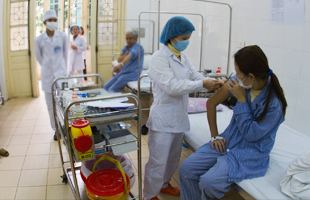
While the fight to reverse the spread of tuberculosis (TB) is gaining momentum, too many people are still affected by this disease. In 2013, 9 million people contracted TB and 1.5 million died from the disease. On World TB Day (24 March 2015), the World Health Organization (WHO) in the Western Pacific Region calls for new actions and commitments in the global fight against TB.
"We must focus on maintaining approaches that have worked well while incorporating new methods and technology to address evolving challenges," said WHO Regional Director for the Western Pacific, Dr Shin Young-soo. "Let us reinvigorate our efforts to reach, treat and cure all patients suffering from TB including drug-resistant forms. We need the concerted efforts of all sectors, not just health workers, to find and fight this disease wherever it hides."
One of the world's leading infectious killers, TB is caused by the Mycobacterium tuberculosis bacteria that most often affect the lungs. Tuberculosis is spread from person to person through the air. When people with TB cough, other people inhale germs and can become infected. Tuberculosis mostly affects young adults in their most productive years. However, all age groups are at risk. Most importantly, TB is curable and preventable. An estimated 37 million lives were saved through TB diagnosis and treatment between 2000 and 2013.
TB in the Western Pacific Region
The Region has made substantial progress and reached the TB-related Millennium Development Goals well in advance of the 2015 deadline. Although the Region's population is increasing, TB cases continue to decline each year—from 2.1 million cases in 2000 to 1.6 million cases in 2013. Since 2000, TB treatment has saved 9 million lives in the Region—this includes both TB patients and those who would have contracted TB from them had they not been treated. Tuberculosis deaths and prevalence have been reduced by more than 50% since 1990.
Despite this success, the challenges of TB remain monumental. Annually, an estimated 1.6 million people develop TB and 110 000 die from this curable illness in the Region. TB concentrates in vulnerable populations, such as migrants, children, older people and the poor. Detecting these cases can be more difficult than in the general population. In addition, an estimated 71 000 multidrug-resistant TB (MDR-TB) cases occur annually in the Region. In 2013, less than 10% of these cases were treated under quality-assured programmes.
WHO response
WHO pursues six core functions in addressing TB: (1) provide leadership on matters critical to TB; (2) develop evidence-based policies, strategies and standards for TB prevention, care and control, and monitor their implementation; (3) provide technical support to Member States, catalyse change and build sustainable capacity; (4) monitor the global TB situation, and measure progress in TB care, control and financing; (5) shape the TB research agenda and stimulate the production, translation and dissemination of valuable knowledge; and (6) facilitate and engage partnerships for TB action.
In 2014, the World Health Assembly approved an ambitious 20 year (2016–2035) strategy to end the global TB epidemic. The End TB Strategy envisions a world free of TB with zero deaths, disease and suffering. The strategy sets targets and outlines actions by government and all partners to provide patient-centred care, pursue policies and systems that enable prevention and care, and drive research and innovations needed to end the epidemic and eliminate TB.
World TB Day provides patients, affected communities, governments, civil society, organizations, health-care providers and international partners an opportunity to put the elimination of TB at the top of the agenda, increasing the momentum to end TB altogether.
"The strategy targets a 90% reduction in patients suffering from TB and a 95% reduction in deaths from TB by 2035 – all while protecting families from catastrophic costs that push them into poverty," said Dr Shin.

/59748.tmb-300v.png?sfvrsn=9885965b_2)


